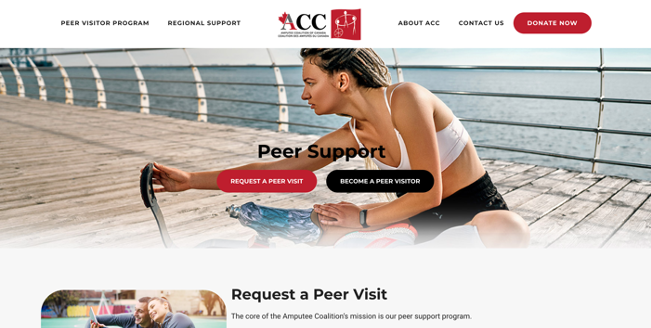Setting up the visit

Referrals may come to you from a number of sources. People can submit a request for a peer visit through the Amputee Coalition of Canada website. If your local hospital or rehabilitation centre has a peer visiting program, the referrals may come from there. Referrals may also come by word of mouth including through your physiotherapist or your prosthetist when they know of people who would benefit from the peer visit.
The information, which you may or may not receive but which would be helpful in planning your visit, includes age; date, level and cause of amputation; any other health conditions such as hearing impairment that might have an impact on the effectiveness of the visit; emotional state; the types of information that have been requested by the person with amputation or by their family; or any other background information that will help you in planning for the visit.
The most effective visits take place in person but when this is not possible visits that have been held over the phone, video conferencing or by email can also be effective.
Once you’ve been given the referral, you should contact the person to arrange a time for the visit that is convenient for them and, if they wish, for the family as well. If the person you’re going to visit is in a facility you may also need to arrange a time that works for the facility.
How do you prepare for the visit? If the person you were going to visit has requested information collect that information ahead of time or any other information that you feel might be helpful to them based on what you know about them. Find out, if possible, whether the person has any special needs including vision or hearing impairments so that you bring the appropriate materials.
Role play – scheduling the visit (15 min) :
Turn to a partner and pretend you are scheduling a visit with them. Make sure to ask questions that will help you prepare for the visit. Some of the information you want to obtain is age; date, level, and cause of amputation; any other health conditions such as hearing impairment that might have an impact on the effectiveness of the visit; emotional state; the types of information that have been requested by the person with amputation or by their family; or any other background information.
Instructor Notes:
Content: Key Concepts to Cover
- How to find/receive referrals
- Resources: e.g Hospitals, Clinics, ACC website
- How to set up a visit
- Explain the procedure for getting in contact with an amputee who is in need of peer support
- How to prepare for a visit
- Offer tips/tricks on researching for resources helpful to amputees
- Give advice on how to better understand the needs of fellow amputees
- Explain the procedure of acquiring accommodations for fellow amputees
Role Playing Activity Facilitation:
- Read role playing activity out loud and split the participants into groups of two. Make sure to answer any pending questions.
- Engage the group in discussion in reflection of how well the communication and interaction turned out
- Offer advice on suitable actions during the role playing activity that will help peer supports in the visitation stage get a sense of how to approach fellow amputees and connect with them.

